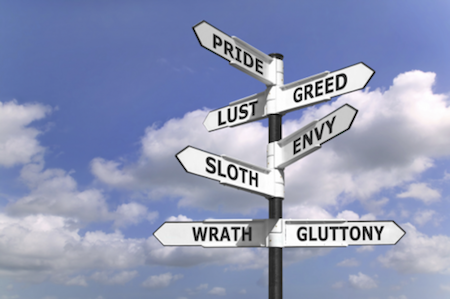
This is a guest post by Wolf Tivy, Beeminder enthusiast, aspiring hero (or possibly supervillain, he hasn’t decided), engineer, programmer, and rationalist.
For a long time I found that I was spending too much time on certain unproductive things and struggled with getting myself to do what I actually wanted to do with my time. The big break came one morning when I noticed that there was a very tight correlation between the things I wanted to stop doing and the traditional Christian concept of Sin.
Once I noticed this, I went straight to the Wikipedia page for the Seven Deadly Sins, and mapped them onto my own vices:
Lust: Porn, flirting, etc.
Gluttony: Junk food like cookies and chocolate. I might add “more than two bowls of spaghetti” here; the stuff is just too easy to eat.
Sloth: Wasting time on stuff that isn’t goal directed or self-improving. Being non-industrious. Failing to strive. Useless news/discussion websites, etc.
Wrath: Acting irrationally out of anger, pain, or frustration. Chewing someone out, violence, slamming doors, etc.
Envy: Not reading, using, or appreciating someone else’s work because solving a problem is caught up in my identity.
I’m too much of a cheapskate to have trouble with material excess (Greed), and haven’t been burned by Pride yet, so I wouldn’t know what to avoid. Maybe I’ll figure these out soon.
“Concepts like Sin come with a rich aesthetic heritage that lends them some emotional weight.”
The nice thing about traditional concepts like Sin is that they come bundled with some guarantees of relative completeness for very little cognitive investment on my part. Someone has tested and developed this thing very extensively; even if it’s not perfect, all I have to do is use it. Further, concepts like Sin come with a rich aesthetic heritage that lends them some emotional weight and solidness that fresh concepts just don’t have. A culture that’s been going for >1500 years will leave behind some impressive artifacts. We would be fools not to take advantage of them.
While I figured all of this out, I had also been looking for a way to beemind my way out of these harmful behaviors. I’d considered a number of schemes, but none were satisfactory. Armed with the concept of Sin, I had a comprehensive and reasonably clear-cut list of things to avoid. When I read how Bethany beeminds sugar-free days, I knew exactly what I had to do.
How it works is this: if I do something that I judge to be sinful, I don’t get to report a Sin-Free Day to Beeminder, otherwise, I do. I need 5 Sin-Free Days per week. [1] Simple as that, and Sin is gone. It’s glorious.
At work, we joke that the accountants are trying to kill us. They leave donuts and chocolate and cookies out for everyone, and we eat them, whether we like it or not. Well not anymore; it’s just not worth it to eat that cookie when it means that I immediately fail the whole day, so I don’t. The only reason I didn’t eat like 20 tasty cookies today is because I beemind Sin.
The traditional solution to akrasia and especially Sin is Willpower and self-loathing. As an akratic, I don’t have Magical Free Will, but I don’t have to hate myself either, because I have the next best thing: Beeminder!
Footnotes
[1] Ironically, this is a Do More goal, but what you’re doing more of is not-sinning. So report a 1 to Beeminder for each day you were sin-free. Otherwise report a 0, or don’t report at all, which is the same thing. Though it might be interesting to report explicit zeros so you can record the actual sinning in the datapoint comments (those are private by default).